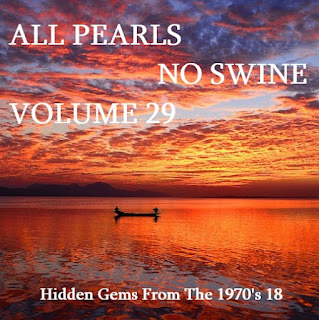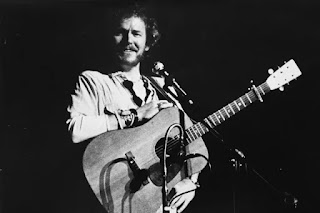You know what these All Pearls, No Swine albums are actually good for, besides providing you with a cool 70 minutes of quality music from decades past? Encountering artists you hadn't heard of before, as they did for me, obviously! So today's album is a follow-up to stumbling onto Michael Johnson's cover of Jackson Browne's "My Opening Farewell" on You Tube, then checking out more of Johnson from the same time period. As I opined in my write-up for All Pearls, No Swine Vol. 22, I think Johnson's confident take on the song is better than Browne's original, and it's one of the highlights of There Is A Breeze, our One Buck Record of the day. I hadn't heard of Michael Johnson before, though I'm sure some of y'all oldtimers remember him from an interesting, topsy-turvy career.
Johnson's first brush with fame came in 1968 when he was drafted into The Mitchell Trio to replace last remaining original member Mike Kobluk, which led Chad Mitchell to disallow the use of his name, with the remaining trio thus becoming Denver, Boise & Johnson, releasing a lone single ("Take Me to Tomorrow") before splitting up. Johnson took some time to plan his next step, stepping away from trecording and touring to star in the off broadway musical Jacques Brel Is Alive And Well and Living In Paris (great title, by the way!). He signed with Atco Records in 1971, but it took until 1973 for his debut album, the very One Buck Record of the day, to be released. It did only local business in the Minneapolis-St. Paul area, so Johnson labored on until The Michael Johnson Album in 1978 with its Top 20 hit "Bluer Than Blue" broke him into the mainstream, albeit as a pure soft rock artist, and those late 70s tracks have a decidedly mainstream adult contemporary, soft rock sheen to them that are less attractive to me personally than these early singer-songwriter songs. At least Johnson played his hand right, veering into contemporary country in the mid-80s and becoming a bona fide country star with two number one hits, though like his colleagues he began to rely on outside songwriters rather than his own compositions. So, let's go back to the beginning instead...

There Is A Breeze is a bit of an odd duck of an album for reasons I will get into, but the highlights of the album are as high as any of his singer-songwriter colleagues of the time. So let's talk quickly about my three favorites from the album (besides "My Opening Farewell"). "Pilot Me" is an true opening statement, in more than one sense. It's open to interpretation, whether the entity the protagonist pleads to to pilot him through the obstacles in his path is a lover, or, you know, god, but it doesn't matter. It's a beautiful, impassioned plea for help and guidance that works both ways. But if I had to pick, I'd say the organ and flugelhorn arrangement points me toward the divine instead of the profane. Either way, it's a beautiful, stately song.
"On The Road" is a lovely, bouncy memoir to younger, carefree times. "We didn't know who we were, we didn't know what we did, we were just on the road". It's essentially a children's song, as is the song that follows it on thjs version of There Is A Breeze, which means they hit something deeper. You might have just heard it, but you instantly feel like you've known this song for forever. The joyous chikldren's choir is a fantastic flourish. If you don't want to join in the chorus while, listening to this, I don't know what to tell ya. "Rooty Tooty Toot For The Moon", the next track, is rhythmically a lullaby for adults, somewhat like James Taylor's "Sweet Baby James". The chorus might be a big ol' pile of nonsense, but you'll not forget it and will catch yourself singing along to it right away: "Singin' rooty toot toot for the moon / it's the biggest star I've ever seen / It's a pearl of wisdom, a slice of green cheese / Burning just like kerosene, burning just like kerosene". Like "On The Road", you feel you've known this song forever, almost instantly. Total instant classic.

For a debut album by the traditional acoustic singer-songwriter there is a nice amount of variety here: "In Your Eyes", definitely more wordly than "Pilot Me", is a nice little gallop that is led by country blues-y playing from fellow folkie Leo Kottke on bottleneck guitar, while "I Got You Covered", driven by bass and congas, is kind of jazzy. The title song uses cello and harp to, respectively, and alternatively foreboding and uplifting effect in what is ultimately as gloomy a relationship song, as, say, Browne's "Latye For The Sky", while strings enhance the sad, elegiac "Old Folks", with its fatalistic reminder of "the old, old silver clock / that hangs on the wall / that waits for us all". There is of course a flipside to all these musical flourishes. With four different producers (including Peter Yarrow and Phil Ramone) laboring over the twelve songs, there is a bit of an 'everything but the kitchen sink' approach to proceedings, as if every producer wanted to highlight a different side of Johnson. He himself felt that the debut album wasn't a true reflection of his music and opted for a more traditional acoustic guitar sound for the follow-up.
But here's the thing: The 'more is more' approach that is applied here makes for listening that never gets into a 'nice, but sounds a little samey' quagmire that the guitar-based singer-songwriter album can sometimes fall into. Say what you will about There Is A Breeze, but it isn't boring. Especially in this slimmed down, all killer no filler version courtesy of good ol' OBG. Well, at least some of these experiments were too much or didn't work, which is why I reconfigured the album, with the old 'addition by substraction' logic. There were two okay-ish horn-driven numbers (a musical direction Johnson tellingly wouldn't follow up on), which I felt was one too many, so I only kept "See You Soon".

But "Happier Days", the first jettisoned track wasn't an almost fatal mistake, like "Study In E Minor", a glacially paced dirge on acoustic guitar that is exactly what the title says. Except it doesn't go anywhere it hasn't been in the very first seconds, and takes a long time to get there. That track always stopped my enjoyment of There Is A Breeze dead in its tracks and made me hurry to the skip button, so skip it we will. Forever. Also tellingly, that this acoustic guitar tracks is the one produced by Johnson, so he might've felt that this was a true representation of him and his folksy roots. I'd also say if Johnson had delivered an album full of tracks in the "Study In E Minor" mold, I wouldn't be singing his praises here today. Lord knows (and my readership, too, if you've been here for a bit) that I love cohesive albums, but There Is A Breeze wouldn't be the sucess it is without some of the production flourishes.
Sequencing, however, was another issue, with the album losing momentum a number of times, so I tried to maintain a number of songs in their original spots while improving the flow elsewhere. While shuffling the tracks around for this version of There Is A Breeze, I felt it was important to keep "Pilot Me" as the opener and the framing device of the original sequencing. Side one ended, as it does here, with "Rooty Toot Toot For The Moon", while side two was ended with a very different kind of lullaby: "You've Got To Be Carefully Taught", from the Rogers-Hammerstein musical South Pacific. Its uneasy, provocative take on racism and hatred passed on from generation to generation end There Is A Breeze on a slightly controversial note, allowing the album a moment of political comment. But it also reminds us of the rousing lullaby about that green cheese pearl of wisdom star, and how the lullabies we sing and the stories we tell our children will shape their, and our, lives.

Michael Johnson got bigger, and the spotlight got brighter, but it is an open question whether he ever bettered There Is A Breeze. It is at least one of the too little known entries in the singer-songwriter canon, that deserves better than its almost total anonymity these days. Get in the breeze, open your ears and see if you'll agree...

















































